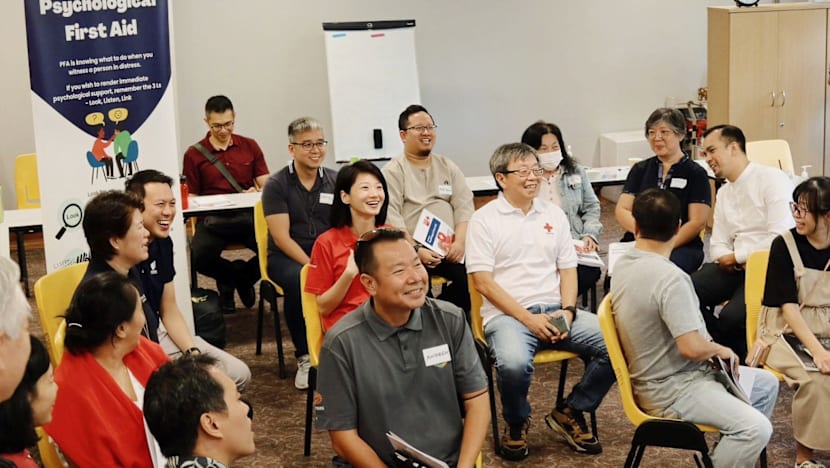Singapore nears goal of training 1,500 responders in psychological first aid
Unlike traditional first aid, psychological first aid addresses invisible wounds to help people manage shock and grief after traumatic events.

Ms Sun Xueling, then-Minister of State for Home Affairs and Social and Family Development (centre), attends the Singapore Red Cross's first psychological first aid training session for SGSecure Responders on May 6, 2023. (Photo: Singapore Red Cross)

This audio is generated by an AI tool.
SINGAPORE: Singapore is on track to train 1,500 SGSecure Responders in psychological first aid by the end of this financial year, as part of a national push to build mental resilience on the frontlines and in the community.
About 1,300 responders have already completed the course, which was launched in 2023 and run by the Ministry of Home Affairs. Participants are taught how to provide calm and compassionate support after a crisis.
Responders also learn how to assess needs, listen empathetically and connect people to help, while recognising stress reactions and promoting safety. The focus is on reducing distress, respecting culture and ethics, and caring for both survivors and responders.
According to the Singapore Red Cross (SRC), youths, workers and caregivers have driven a nearly 20-fold increase in demand over the past five years for psychological first aid training.
Last year alone, SRC trained about 7,500 people, including 475 responders. Since 2019, another 10,000 have been trained by the Singapore Emergency Responder Academy.
WHAT IS PSYCHOLOGICAL FIRST AID?
Unlike traditional first aid, which treats physical wounds, psychological first aid focuses on unseen emotional injuries - distress, shock, or grief.
It is an evidence-based intervention designed to reduce trauma-related stress and help individuals recover emotionally after an emergency. The concept gained global momentum after the 9/11 attacks in the United States, which triggered a pressing need for structured emotional support.
In Singapore, psychological defence is one of the six pillars of Total Defence. It emphasises national resilience in the face of uncertainty or threat.
The COVID-19 pandemic, for instance, changed how Singaporeans viewed mental wellbeing, said Dr Jared Ng, a psychiatrist and senior consultant at Connections MindHealth.
“People talked about social isolation, about uncertainty, how it affected themselves and other people, and made people more aware of topics like mental health,” Dr Ng told CNA.
In June, Singapore launched a national mental helpline - mindline 1771 - with trained counsellors providing round-the-clock free support to those who need it.
Its largest group of users are young working adults, followed by teenagers.
“The topic of mental health is certainly less stigmatised now. People will talk about anxiety, stress and burnout a lot more openly,” said Dr Ng.
“Now I see companies, HR teams, teachers, managers, grassroots volunteers and parents signing up … perhaps because of an encounter (with) family members having mental health distress, colleagues breaking down at work,” he added.
START TRAINING YOUNG
Family counselling psychologist Adrian Lim said he believes psychological first aid training should start in schools.
“Many (in schools) are not trained, and they get very overexcited, hysterical or kancheong (nervous), and that doesn't help,” he told CNA.
Mr Lim added that psychological first aid can complement therapy. It is akin to taking someone to the emergency room, or performing CPR (cardiopulmonary resuscitation) on them, before getting them further care, he said.
It also “shortens the time between distress and getting (someone) the help that they need … before the issues spiral”, added Dr Ng.
“Importantly, it reduces the sense of isolation. The person feels seen and safe, and they are not alone,” he noted.
“These things, when done well, really help to build resilience in schools, in workplaces and in the community, by addressing (issues) early before they escalate into something more serious, like aggression or suicidality."
HOW TO HELP SOMEONE IN DISTRESS
First, avoid saying something that may dismiss their feelings. This includes phrases such as “don’t cry”, “it’s not that bad” and “cheer up”.
Another mistake? Assuming you know what they need without first listening.
“We talk too much and we listen too little, and then we feel that silence is very uncomfortable. But actually, silence sometimes is what is needed,” said Connections MindHealth's Dr Ng.
“Sometimes, when someone comes to us in distress … we end up asking a lot of questions. We dig into the details of the distress they're going through, and that can cause them to be re-traumatised by it."
Dr Ng suggested following the “3Ls” framework when administering psychological first aid:
- Look - Assess the situation. Is it safe? Identify who needs help
- Listen - Introduce yourself, ask about their concerns, and attend to their immediate needs
- Link - Connect survivors with medical care, legal aid, or even reunite them with loved ones.
When it comes to soothing one’s own emotions, Mr Lim recommends a technique known as havening, where one gently places their hands across their shoulders and strokes down their arms while saying calming phrases like “it’s going to be okay”.
Breath techniques, such as box breathing, can also help one calm down, he added.
NOT JUST FOR THE PROFESSIONALS
While psychological first aid continues to gain traction in Singapore, some misconceptions discourage more people from taking up such training, experts said.
For one, many continue to associate first aid with something solely physical, and not emotional, and that psychological first aid is something only professionals can administer.
Cost and time are also barriers for working adults, unless training is subsidised or tied to workplace requirements.
To address these challenges, organisations like SRC are leveraging government initiatives such as SkillsFuture to make such courses more affordable.
The Singapore Emergency Responder Academy has also introduced flexible learning options, including e-learning and live virtual sessions, to make courses more accessible.
Where to get help:
National mental health helpline: 1771
Samaritans of Singapore Hotline: 1767
Singapore Association for Mental Health Helpline: 1800 283 7019
You can also find a list of international helplines here. If someone you know is at immediate risk, call 24-hour emergency medical services.


















